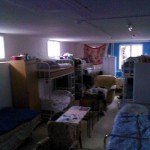- A szálláson 22 óra után nem lehet főzni, mosni, zuhanyozni és internetezni. A menekültek és oltalmazottak többségének családtagjai azonban elérhetetlenül távol, és gyakran veszélyben élnek. A nemzetközi védelemben részesített személyeknek a családtagjaikkal való rendszeres kapcsolattartása az egyik legfontosabb része a jelenlegi életüknek. Ezen lehetőségnek egy olyan időtartamra való korlátozása, amely a távol élő családtagoknak az időeltolódás következtében alkalmatlan a kapcsolattartásra, az itt élő menekültek és oltalmazottak egészségi állapotának romlásával járhat.
- A szállás lakói csak a rendelkezésre álló tároló helyek méretét nem meghaladó mennyiségű személyes tárgyat vihetnek magukkal, amely azonban korlátozza a menekültek és oltalmazottak magánéletét.
- A szállást a lakóknak a takarítás idejére el kell hagyniuk, amely oda vezethet, hogy a menekülteknek és gyermekeiknek naponta akár két órán keresztül is az utcán kell tartózkodniuk, míg vissza nem mehetnek ágyukhoz.
- A rendszeresen megtartott lakó- és szobagyűléseken a házirend szerint kötelező részt vennie mindenkinek, ám a menekültek és oltalmazottak többsége még nem sajátította el a magyar nyelvet, amely miatt ezen kötelezettség szintén pusztán terhet jelentene számukra.
On the 4th of April, members of Migráns Szolidaritás and refugees from the Bicske Camp visited a homeless shelter in Budapest in Budafoki út. At a recent meeting regarding the housing of refugees Office of Immigration and Nationality (OIN) proposed that refugees who must leave the Bicske camp could use homeless shelters as a solution. Migráns Szolidaritás supports a realistic and adequate solution for the refugees’ housing problem. We visited the above mentioned homeless shelter to investigate and to see it with our own eyes where the refugees are supposed to live.
In the shelter visited by us, up to 150 homeless people can be housed. At the time of our visit the shelter was full. Only three places, in different rooms, were still “reserved” for refugees in this shelter, probably because of an agreement between OIN and Baptist Aid. According to the information given by the helpful and cooperative staff, the Baptist Aid could altogether offer nine to ten palaces (for adults) in the three shelters operated by them (each with a capacity of 150 people) at the time of our visit.
It is hardly surprising that there is not much space in the rooms as they are crammed with beds. We saw rooms for two people, in other rooms eight persons are living and shared kitchens can be found on every floor. Regarding medical treatment, the staff explained to us that residents can only receive a temporary address card while living in the homeless shelter. This is why average doctors can refuse treatment of the residents. As a result, residents must go to the reduced medical services offered specially for homeless people. For this reason and because the unavoidable crowded living spaces, where strangers must share a limited space, homeless shelters cannot be seen as a proper answer to Hungary’s refugee housing problem. Here it must be emphasized that a high number of refugees still today suffer from many kinds of trauma as a result of their experiences in their countries of origin and from their journeys and therefore are in dire need of special treatment. Furthermore, many of these refugees were detained in cramped Hungarian prisons – sometimes even for a long period – when they entered Hungary as asylum-seekers. Migráns Szolidaritás finds it shocking that the OIN could consider this to be a valid option. Imagine these traumatized people forced to live in overcrowded homeless shelters, where the police are called nearly every week because of fights between the residents. This scenario could have an extremely negative effect on mental and physical health of the traumatized Bicske refugees.
Furthermore, it is obvious that even for refugees without any medical problems an independent life and a successful integration into the Hungarian society cannot start from a homeless shelter. Yet, this is the “solution” that has been offered by OIN.
Also, the shelters do not have near enough capacity for the 92 people who officially should have left the Bicske Camp at the end of March. It must also be taken into consideration that there will be another 150 people who must leave the camp soon. Furthermore, most shelters only offer places for individual men and women – not families. Although there is another homeless shelter for 22 families, it is important to emphasize that this shelter is not able to accommodate new families at the moment because it is already full.
Migráns Szolidaritás believes that until OIN offers a better, more humane solution than homeless shelters for Bicske refugees, they should be allowed to remain in Bicske camp.
